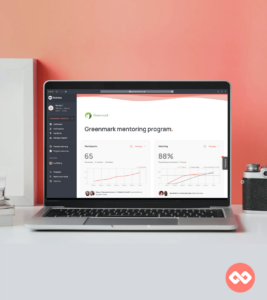Not everyone has the good fortune to work at an organization where mentoring is offered as part of their internal professional development. Instead, you may be forced to look to external networks to find a mentor. For some, they may be a member of an industry body where a mentor program is offered. However, these are sometimes limited to only a select few members participating due to either the cost involved or the scarce number of mentors available.
So where else can you find a mentor?
Understanding the Role of a Mentor
Before we dive into the various avenues for finding a mentor, let’s take a moment to understand the invaluable role a mentor plays in our lives. A mentor is not merely a source of information but a trusted advisor, a sounding board, and a cheerleader all rolled into one.
Furthermore, a mentor serves as a role model, offering guidance based on their own experiences and wisdom. They can provide insights that you may not have considered, helping you navigate challenges and opportunities with clarity and confidence. A mentor’s influence goes beyond just the exchange of knowledge; it fosters personal growth and self-discovery, empowering you to reach your full potential.
The Importance of Mentorship
Mentorship is a powerful tool that has been proven to drive personal and professional growth. Having a mentor can increase your chances of success, prevent costly mistakes, and provide you with unparalleled support and encouragement along your journey. It’s like having a guiding light to illuminate the path ahead.
Moreover, mentorship creates a symbiotic relationship where both mentor and mentee benefit. While the mentee gains valuable insights and guidance, the mentor hones their leadership and coaching skills, finding fulfillment in helping others succeed. This reciprocal exchange of knowledge and support forms the foundation of a strong mentorship bond that can last a lifetime.
Different Types of Mentors
Mentors come in all shapes and sizes, and finding the right mentor for you is crucial. There are different types of mentors, each with their own unique strengths and areas of expertise. Some mentors specialize in career development, while others excel in personal growth or specific industries. Consider what type of mentor would best serve your needs.
Additionally, mentors can offer different styles of mentorship, such as hands-on coaching, strategic advising, or even emotional support. Understanding your learning style and preferences can help you identify the type of mentorship that resonates most with you. By seeking out mentors who align with your goals and values, you can maximize the impact of the mentorship relationship and propel yourself toward success.
Identifying Your Mentorship Needs
Now that we understand the significance of mentorship, it’s time to identify our own mentorship needs. Reflect on where you currently stand in your personal and professional life. What are your goals? What areas do you need support and guidance in? By defining your mentorship needs, you’ll be better equipped to embark on the journey of finding the perfect mentor.
When considering your mentorship needs, it’s essential to delve deeper into the specific challenges you are facing. Are you looking to enhance your leadership skills, improve your work-life balance, or navigate a career transition? Understanding the nuances of your requirements will enable you to find a mentor who can offer tailored guidance and support to address these unique aspects of your journey.
Defining Your Goals
Ask yourself: What do I want to achieve in the next year? Five years? Ten years? Set clear goals for yourself and consider how a mentor can assist you in reaching them. Having a mentor who aligns with your goals can provide invaluable advice and insights to help you navigate the hurdles that lie ahead.
Furthermore, it’s beneficial to break down your long-term goals into smaller, actionable steps. By establishing milestones along the way, you can track your progress and leverage your mentor’s expertise to overcome obstacles and stay on course toward achieving your ultimate objectives.
Recognizing Your Weaknesses
None of us are perfect, and recognizing our weaknesses is a crucial step toward personal and professional growth. Take a moment to assess your weaknesses and areas where you feel you could use some guidance. Remember, a mentor is there to help you acknowledge and overcome these weaknesses, turning them into strengths.
In addition to identifying your weaknesses, it’s valuable to reflect on your strengths and how they can complement areas where you may need improvement. A mentor can not only support you in addressing your weaknesses but also empower you to leverage your strengths effectively, fostering a well-rounded skill set that propels you toward success.
Where to start looking for a mentor:
Professional Networks
The most obvious place to look first is your professional network. However, the challenge is identifying who might be willing to give their time and who is going to be the best ‘fit’ to be your mentor. Often the most obvious choice has already been asked by 100 people before you so you also need to be conscious that asking this of someone is probably not a new thing for them. We suggest shortlisting 5 of your preferred options and then approaching them with a more general question — or perhaps acknowledging they’ve had a direct experience in something you’re interested in. Play to their ego — everyone always likes being asked their opinion, as opposed to asking someone up front to be your mentor might get them on the back foot from the start.
Personal Networks
Sometimes we just assume that our friends and family know us well enough that they would naturally make a suggestion or introduction if they thought it relevant. The thing is we are all busy people and chances are you are not on your mate’s top priority list. Again, talk to your friends/family more generally about the problem you are facing and what might be the best way to connect with someone to solve it. If you ask them to help with workshopping a solution they are going to have a better understanding of your problem and may be more inclined to offer up some of their personal connections.
Leveraging Existing Relationships
Think about your friends, family, and colleagues. Are there individuals who have achieved what you aspire to accomplish? Reach out to them and express your desire for guidance. Often, people are more than willing to share their wisdom and offer their support.
Building a mentorship relationship with someone you already know can deepen your connection and create a safe space for vulnerability and growth. It’s not just about finding a mentor; it’s also about fostering a mutually beneficial relationship where both parties can learn and grow together.
Reaching Out to Acquaintances
Don’t limit yourself to close relationships when searching for a mentor. Cast your net wider and consider reaching out to acquaintances or connections within your broader network. You may be surprised by the fresh perspectives and opportunities that await you.
Expanding your search beyond your immediate circle can open doors to new possibilities and connections. Sometimes, the most unexpected mentors can offer the most profound insights and support. Embrace the opportunity to learn from a diverse range of individuals and expand your horizons in ways you never imagined.
Industry Bodies and Associations
If you’re seeking to connect with someone in your industry it might be worthwhile researching what relevant networks/member groups exist. While some industry bodies can be expensive to join, there are alternatives. A quick search via LinkedIn might reveal a number of industry-focussed interest groups which you can join for free. MeetUp is also a valuable online events network that may lead to specialist events being held in your city where you can physically go along and network and potentially connect with someone who might be willing to mentor you.
Your parents’ networks
You may think your parents are out of touch and out of date but there is no denying that after many years of work and life experience, most of our parents will have someone within their network who could be a very useful contact. Even if they don’t, they’ll love you even more for asking!
We know that it can be challenging to connect with someone who not only is able to provide you with some guidance but also that you have a natural rapport. That’s why you should view this process as if you were courting a love interest. You don’t ask to marry someone after the first date, so you shouldn’t ask someone to be your mentor after a first meeting. Take your time — there’s someone out there for everyone!
No matter how you find them – make sure you do. Here are 4 ways a mentor can benefit your career.




